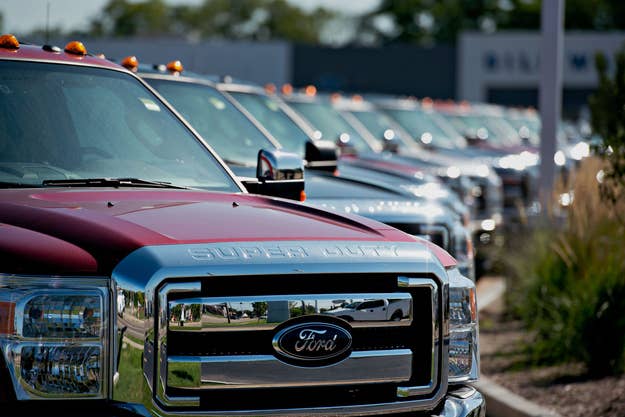
The prevailing wisdom on Wall Street that pickup truck sales suffered irreversible damage in the recession is not only overblown, but just plain wrong.
That's according to several analysts who say pickup truck sales are poised for a big comeback in the coming months. They cite three key factors for the recovery: easier access to credit; a boom in the housing market contributing to a rise in work-use pickup purchases; and deferred demand from "personal use" truck owners once thought to have all but disappeared after the 2008 financial crisis.
A note from J.P. Morgan last week on August U.S. auto sales stated that profits from full-size pickup truck sales were up 15.1% from the prior year, outpacing the 12.8% year-over-year rise for the auto industry overall. Moreover, pickup truck sales represented 11.9% of the whole auto market last month. This, the note said, is a huge boon for the Detroit Three, which control 93 % of the pickup truck segment.
Indeed, Detroit's Big Three automakers are all poised to benefit from the resurgent demand. Both Chrysler and General Motors are actually rolling out new pickup models. But Ford, whose F Series of trucks has been the top seller among pickups, is best positioned to take advantage of the renewed interest, wrote Citi analyst Itay Michaeli in a report Tuesday that urged investors to "buy Ford now."
"Our thesis has really argued that [Wall] Street has grossly misinterpreted what's actually gone on in demand for pickup trucks in the last few years," Michaeli said in an interview. "People thought the pickup truck market is doomed in the crisis."
As Michaeli explains, at the height of the pickup truck market in 2004, when 15% of all autos sold were pickup trucks, about 25 % of purchasers were "personal use buyers" — people who chose to own pickups for non-work related purposes. The common perception when the crisis hit in 2008, however, was that this kind of buyer would leave the market and never come back, thus eliminating one-fourth of the potential buyers for pickup trucks.
"All of that is entirely bogus, it didn't happen," Michaeli said. "We've got some strong evidence suggesting that what actually transpired in the last few years wasn't the buyer leaving the market, just a deferral of demand. They didn't trade in for a small car to never go back to a pickup truck. They held onto them, and as of today, the age of pickup trucks are approaching that sweet spot for replacement."
Steve Dyer, an analyst at Craig-Hallum agrees that demand from replacement buyers is on the rise, but attributes the imminent spike in pickup truck sales more to the work-use crowd.
"Pickup trucks are growing a lot more rapidly than the overall industry," said Dyer. "It's driven by a lot of pent-up demand from trucks that are 12-14 years old, used for agriculture, energy, and, in part, residential construction. There was not a lot happening for the last five years. The housing rebounding has driven that cycle. There's certainly those that prefer driving a pickup truck. We sort of view this as primarily a work truck driven rebound."
Still another view holds that, in addition to the housing boom, the pickup truck segment rebound is a result of easier access to credit and a wider selection of new models.
"A chimp with a pen can get a loan right now for a car, so that's not really an issue holding back demand," said Matt Stover, analyst with Guggenheim Capital Markets. "There's also more consumer confidence; folks with old trucks now have access to the market, the economy is doing better, interest rates are low and folks who work in the construction industry want or need a new truck. The question going forward is, how long does this rally relative to the market endure?"
